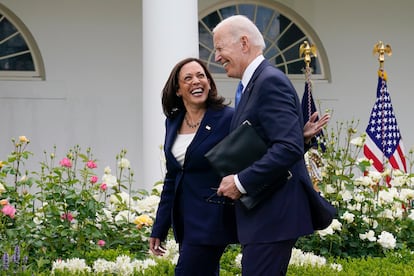Kamala Harris, a last-minute option for the toughest mission
After working as a lawyer, attorney general of California and senator, she became the first woman to serve as vice president of the United States


John Adams, the second president of the United States, defined the vice presidency as the “most insignificant office,” and Republicans consider that the Democrat Kamala Harris’ tenure as VP has been precisely that. But the 59-year-old Harris — the first female vice president, the first African-American and first Asian-American vice president to take the oath, in 2021 — now has a historic opportunity to hit back at the Trump universe. Never in the history of the United States has a vice president taken up the fight for the presidency at such a late stage of the campaign.
Before he was president, Adams was George Washington’s vice president, so he knew what he was talking about. He set the precedent for the transition from one office to another, and since then, at the end of the 18th century, three sitting vice presidents have been elected president, as well as two former vice presidents, including Joe Biden. It has been a kind of Sudoku of ambitions and misfortunes, like those that brought her boss to the White House in 2020 and, this Sunday, permanently distanced him from it.
Since the era of Adams and the founding fathers, the position of vice president has gained in substance: Harris, the successful California lawyer — too Californian, that is to say, too liberal for the Republicans — has assumed part of the immigration policy of the Biden Administration since 2021, to the point of being ridiculed by the opposition as the “immigration czarina.” After the Supreme Court overturned Roe vs. Wade, the doctrine that enshrined the constitutional protection of the right to abortion, in June 2022, Harris also became the standard-bearer of women’s sexual and reproductive health, a political ace that allowed the Democrats to save the day at the midterm elections in November of that year. A self-confessed feminist, her decision to wear white on the night of the celebration of the Democratic victory in Wilmington (Delaware) recalled the role of the suffragettes.
A pure example of the Democratic elite, Harris arrived at the White House as Biden’s number two after having challenged him in the primaries. Her resume included a term in the Senate (2017-2021) and, previously, six years of experience as Attorney General of California (2011-2017). Attorney General and Senator, in that order: the classic ladder to power in the United States; the culmination of years of experience as, first, deputy district attorney (1990-98) in Oakland, a position that earned her a special reputation for being tough on cases of gang violence, drug trafficking and sexual abuse, and district attorney (2004), the springboard to the State Attorney General’s Office.
Those were the days of Democratic president Barack Obama, and of the hangover from the Great Crisis of 2008, with its history of bankruptcies. Harris demonstrated her political independence, rejecting pressure from the government to reach an agreement on a national lawsuit against mortgage lenders for unfair practices (the junk or subprime mortgage hole had not yet been closed). Persevering and tough, in 2012 she achieved a debt relief five times higher than the one Washington was urging her to close. But her special merit was overturning Proposition 8 (2008), a California ballot proposition and a state constitutional amendment intended to ban same-sex marriage, in 2013. Her book Smart on Crime, published in 2009, was considered a model to address the problem of criminal recidivism.
In addition to being the most natural and above all an automatic replacement for Biden without having to deal with an emergency convention four months before the elections — something that the progressive Alexandria Ocasio-Cortez, among others, had warned against — Biden now seems to be returning the favor to Harris. In 2020, she had seemed like a solid contender for the Democratic nomination in a particularly crowded primary, but she threw in the towel in December 2019. Three months later, at the dawn of the Covid pandemic, she gave her support to Biden, the sixth of all candidates for the position. The Democratic competition was then reduced to a duel between Biden and the leftist Bernie Sanders, but Harris’ support for the current president was decisive in bringing him to the White House.
Even then, her name appeared with some frequency in the vice presidential pools, just as now, since the fatal debate on June 27 that showed Biden’s decline, she sounded like a candidate for the presidency. The Republicans, who this week joked about the debate that will pit the two vice presidential candidates against each other by refusing to set a date because they “don’t know the identity of the vice president” that Kamala Harris would choose, appear to have got it right.
Sign up for our weekly newsletter to get more English-language news coverage from EL PAÍS USA Edition
Tu suscripción se está usando en otro dispositivo
¿Quieres añadir otro usuario a tu suscripción?
Si continúas leyendo en este dispositivo, no se podrá leer en el otro.
FlechaTu suscripción se está usando en otro dispositivo y solo puedes acceder a EL PAÍS desde un dispositivo a la vez.
Si quieres compartir tu cuenta, cambia tu suscripción a la modalidad Premium, así podrás añadir otro usuario. Cada uno accederá con su propia cuenta de email, lo que os permitirá personalizar vuestra experiencia en EL PAÍS.
¿Tienes una suscripción de empresa? Accede aquí para contratar más cuentas.
En el caso de no saber quién está usando tu cuenta, te recomendamos cambiar tu contraseña aquí.
Si decides continuar compartiendo tu cuenta, este mensaje se mostrará en tu dispositivo y en el de la otra persona que está usando tu cuenta de forma indefinida, afectando a tu experiencia de lectura. Puedes consultar aquí los términos y condiciones de la suscripción digital.








































